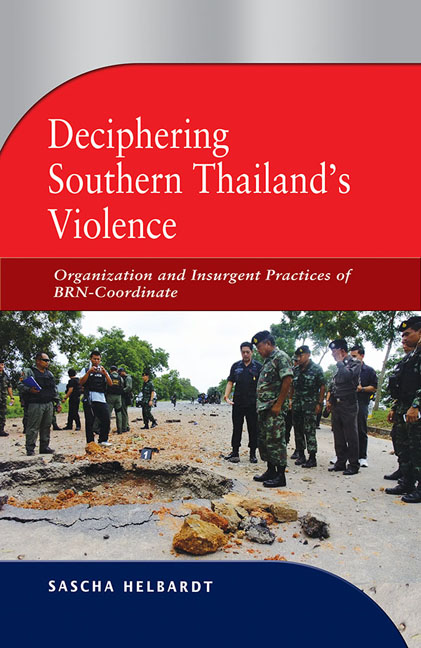Book contents
- Frontmatter
- Dedication
- Contents
- List of Figures
- List of Abbreviations
- Preface and Acknowledgments
- 1 Introduction
- 2 Organizational Aspects of BRN-Coordinate
- 3 Making Insurgents: Recruitment, Training and Control
- 4 Bringing the Actors Back In: Who Are the Insurgents?
- 5 Making Sense of Violence: Power and the Insurgency's Communicative Side
- 6 Conclusion
- References
- Bibliography
- About the Author
Preface and Acknowledgments
Published online by Cambridge University Press: 19 May 2017
- Frontmatter
- Dedication
- Contents
- List of Figures
- List of Abbreviations
- Preface and Acknowledgments
- 1 Introduction
- 2 Organizational Aspects of BRN-Coordinate
- 3 Making Insurgents: Recruitment, Training and Control
- 4 Bringing the Actors Back In: Who Are the Insurgents?
- 5 Making Sense of Violence: Power and the Insurgency's Communicative Side
- 6 Conclusion
- References
- Bibliography
- About the Author
Summary
This book has its origins in the research project, “Religious Dimensions of Local Conflicts”, at the University of Passau, funded by the German Research Council (DFG) from 2006 to 2008. Studying one of the bloodiest conflicts in Southeast Asia, which has to date lasted nearly a decade, my initial task as a PhD student was to analyse religious discourses that served to legitimize violence in Southern Thailand in both Muslim and Buddhist discourses. At that point of the project, the latter was of particular interest to me because most research on the legitimacy of collective violence had neglected the Buddhist perspective. Upon further exploration, the fact that was most startling to me about the violence in Southern Thailand was, however, the near total absence of identifiable collective actors on the Malay Muslim insurgent side, which linked political demands with acts of violence in a similar fashion to the practices of the Liberation Tigers of Tamil Eelam (LTTE) in Sri Lanka or the Kachin Independence Organisation (KIO) in Myanmar. Since the outbreak of violence in Thailand's Malay- Muslim-dominated provinces (Narathiwat, Yala, and Pattani) in 2004, much has been written about the region and the causes of this bloody conflict. Nonetheless, little is known about the perpetrators of these violent acts, as the description as well as interpretation of data is impeded by a cloud of “nameless” violence that renders the identification of the actors and interests involved difficult. While acts of state violence against the Malay minority can be identified more or less easily, the motives and organization of those on the “other side” are all the more heavily cloaked in secrecy, deception, and speculation. Few rebel groups in Southeast Asia have been as successful in hiding themselves from the outside world for so long.
This contradiction was also reflected during my fieldwork, as despite the fact that there was an abundance of popular explanations of why Thailand's Malay minority demanded independence from the country as well as information about the political and economic conditions of the insurgency, the insurgents themselves were shrouded in darkness — although no credible source of information doubted their existence. It is always tempting to rely on popular explanations and treat them as self-explaining factors for collective violence, especially if they involve culture, ethnicity, or religion.
- Type
- Chapter
- Information
- Deciphering Southern Thailand's ViolenceOrganization and Insurgent Practices of BRN-Coordinate, pp. xi - xivPublisher: ISEAS–Yusof Ishak InstitutePrint publication year: 2014



